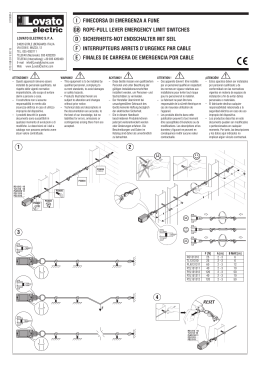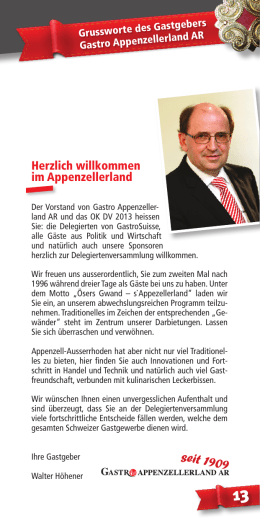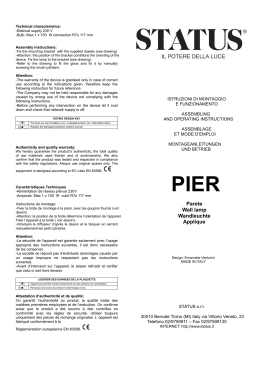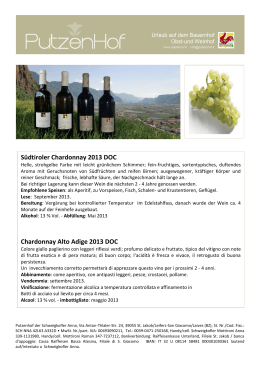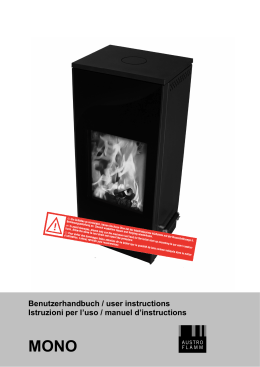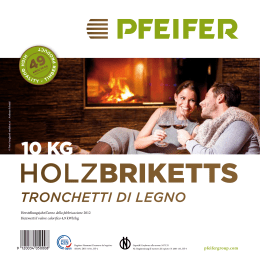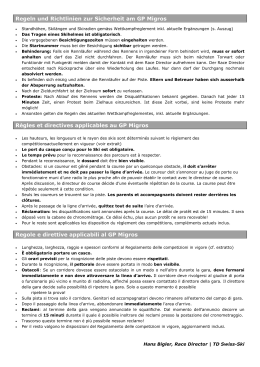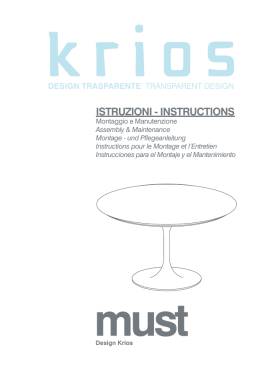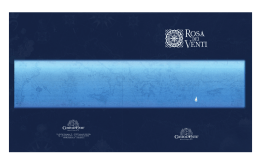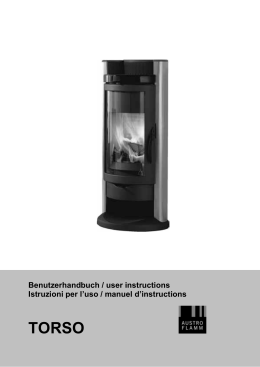Benutzerhandbuch / manual / manuale / manuel Benutzerhandbuch / user instructions Istruzioni per l’uso / manuel d’instructions Gussofen G2 Fig. 1 Fig. 2 deutsch AUF – ZU Sekundärluftschieber Primärluftschieber english open – closed secondary air supply primary air supply italiano aperto – chiuso Regolazione aria secondaria Regolazione aria primaria deutsch Inhalt english Contents italiano Indice 1. Techn. data 4 2. Important information 4 3. Correct operation of your stove 5 4. The most important spare parts - overview 6 Guarantee 13 1. Dati tecnici 2. Informazioni importanti 3. Per un uso corretto della vostra Kaminofen 4. Prospetto dei ricambi principali Garanzia 1. Techn. Daten 2. Wichtige Informationen 3. So bedienen Sie Ihren Kaminofen richtig 4. Die wichtigsten Ersatzteile - Übersicht Garantie 1 1 2 3 13 français ouvert - fermé Coulisseau d’entrée d’air second. Coulisseau d’entrée d’air primaire français sommaire 7 7 8 9 14 1. Caractéristiques 2. Infos importantes 3. Bien utiliser votre poêle 4. Principales pièces détachées Garantie 10 10 11 12 14 Deutsch 1 G2 1. TECHNISCHE DATEN Als Gussofen der Bauart 1 ist ein Anschluß an einen bereits mit anderen Öfen und Herden für feste Brennstoffe belegten Schornstein möglich, sofern die Schornsteinbemessung gemäß DIN 4705, Teil 3, dem nicht widerspricht. TECHNISCHE DATEN Höhe Breite Tiefe Gewicht Gewicht mit Keramikmantel Rauchrohrabgang Durchmesser Nennwärmeleistung lt. EN 13240 Maximale Heizleistung 751 mm 690 mm 585 mm 162 kg -----------150 mm 11 kW 16 kW Kleinste Heizleistung Raumheizvermögen (abhängig von der Hausisolierung) 5 kW 146 – 415 m³ Abgaswerte für die Mehrfachbelegung des Schornsteines nach DIN 4705, Teil 3 bzw. zur Bemessung des Schornsteines nach DIN 4705, Teil 2 Abgasmassenstrom geschlossen 11,7 g/s Abgastemperatur geschlossen 265 °C Mindestförderdruck bei geschlossen 12 Pa Nennwärmeleistung (Nwl) bei 0,8facher 10 Pa Nwl 2. WICHTIGE INFORMATIONEN Normen, örtliche und baurechtliche Vorschriften sowie feuerpolizeiliche Bestimmungen sind einzuhalten. Allgemeine Sicherheitshinweise zum Betrieb Ihres Kaminofens • Lesen Sie vor der Inbetriebnahme des Ofens das gesamte Handbuch gründlich durch und beachten Sie die Warnhinweise. Für den Transport Ihres Heizgerätes dürfen nur zugelassene Transporthilfen mit ausreichender Tragfähigkeit verwendet werden. • • Ihr Heizgerät ist nicht zur Verwendung als Leiter oder Standgerüst geeignet. Durch den Abbrand von Brennmaterial wird • Wärmeenergie frei, die zu einer starken Erhitzung der Oberfläche des Heizgerätes, der Türen, der Tür- und Bediengriffe, der Türgläser, der Rauchrohre und gegebenenfalls der Frontwand des Heizgerätes führt. Die Berührung dieser Teile ohne entsprechende Schutzbekleidung oder Hilfsmittel wie z.B. Hitzeschutzhandschuhe oder Betätigungsmittel (kalte Hand), ist zu unterlassen. Machen Sie Ihre Kinder auf diese besondere • Gefahr aufmerksam und halten Sie sie während des Heizbetriebes vom Heizgerät fern. Verbrennen Sie ausschließlich das im Kapitel • „saubere Verbrennung“ angeführte, genehmigte Heizmaterial. Das Verbrennen oder Einbringen von leicht • brennbaren oder explosiven Stoffen, wie leere Spraydosen und dgl. in den Brennraum, sowie deren Lagerung in unmittelbarer Nähe Ihres Heizgerätes, ist wegen Explosionsgefahr strengstens verboten. • Beim Nachheizen sollen keine weiten, oder leicht brennbaren Kleidungsstücke getragen werden. • Das Abstellen von nicht hitzebeständigen Gegenständen auf dem Heizgerät oder in dessen Nähe ist verboten. • Legen Sie keine Wäschestücke zum Trocknen auf den Ofen. Auch Wäscheständer oder dgl. müssen in ausreichendem Abstand vom Heizgerät aufgestellt werden – Brandgefahr. • Der Gussofen G2 ist keine DauerbrandFeuerstelle. • Beim Betrieb Ihres Heizgerätes ist das Verarbeiten von leicht brennbaren und explosiven Stoffen im selben oder in anschließenden Räumen verboten. Ofenaufstellung Einzuhaltende Sicherheitsabstände (Mindestabstände - siehe auch Typenschild) Fig. 2 a > 800 mm b > 500 mm c > 200 mm (a - nach vorne im Strahlungsbereich) (b - seitlich) (c – hinten) Bitte beachten Sie, dass der Aufstellungsraum mind. eine Türe / ein Fenster ins Freie aufweist oder mit einem derartigen Raum direkt verbunden sein muss. Andere Feuerstätten und Dunstabzugshauben dürfen nicht im Raumluftverbund mit Feuerstätten betrieben werden. Technische und optische Änderungen, Satz- und Druckfehler vorbehalten. Die Informationen in diesem Handbuch sind allgemeiner Natur. Nationale und europäische G2 2 Bodentragfähigkeit Prüfen Sie vor dem Aufstellen, ob die Tragfähigkeit der Unterkonstruktion dem Gewicht Ihres Gussofens standhält. Verbrennungsluft Als Betreiber müssen Sie für ausreichende Verbrennungsluft sorgen. Bei abgedichteten Fenstern und Türen kann es sein, dass die Frischluftzufuhr nicht mehr gewährleistet ist, bzw. das Zugverhalten des Ofens beeinträchtigt wird. Ggf. muss für eine Deutsch zusätzliche Frischluftzufuhr gesorgt werden. Bitte befragen Sie Ihren Fachhändler. Rauchrohranschluß Für den Anschluß der Rauchrohre an den Schornstein gibt es zu Ihrer eigenen Sicherheit strenge Richtlinien. Ihr Kaminofen-Fachhändler kennt diese. Beauftragen Sie daher unbedingt Ihren Fachhändler mit dem Rauchrohranschluß. 3. SO BEDIENEN SIE IHREN GUSSOFEN RICHTIG Zugelassene Brennstoffe Trockenes, gut abgelagertes, naturbelassenes Holz (Hartholz bevorzugt), Holzbriketts. Maximale Brennstoffmenge Maximal aufzugebende Brennstoffmenge: ca. 4,8 kg Holz. Größere Brennstoffmengen können zu Überhitzung und Beschädigungen am Ofen führen! Das Brennholz muß trocken (rel. Holzfeuchte < 15 %) und unbehandelt sein. Außerdem muß die richtige Brennholzmenge verbrannt werden, um eine saubere, emissionsarme Verbrennung zu erreichen. Richtig Feuer machen Bereiten Sie alles zum Anheizen vor – Weichholzspäne, Anzündhilfe (wie z.B. Austroflamm Anzünder), Brennholz. Fig. 3 gibt Ihnen eine Richtlinie hinsichtlich der Menge an Heizmaterial. Öffnen Sie die Primär- und Sekundärluftzufuhr maximal. (siehe Fig. 2 „AUF“). Öffnen Sie die Ofentür Legen Sie 2 – 3 Stk. Anzündhilfen auf den Feuerraumboden. Legen Sie darauf eine handvoll Weichholzspäne. Legen Sie auf diese Späne 1 – 2 Scheite Holz. Fig 3: Anzünden Zünden Sie nun die Anzündhilfen an. Schließen Sie die Feuerraumtür. Sobald die Weichholzspäne gut brennen, schließen Sie den Primärluftschieber (siehe Fig. 2 „ZU“). Primärluftschieber schließen Sobald die Holzscheite gut brennen, können Sie mit dem Sekundärluftschieber die Heizleistung regulieren (Schieber auf Maximalstellung „AUF“ = maximale Heizleistung – siehe Fig. 2). Beim Nachlegen gehen Sie prinzipiell wie beim Anheizen vor: beide Luftschieber öffnen, Ofentüre vorsichtig öffnen, Holz nachlegen, Türe schließen. Warten Sie, bis das nachgelegte Holz brennt. Dann schließen Sie den Primärluftschieber. Regeln Sie in der Folge die Heizleistung mit dem Sekundärluftschieber. Regeln Sie in der Folge die Heizleistung mit dem Luftschieber. Heizen in der Übergangszeit In der Übergangszeit, d.h. bei höheren Außentemperaturen, kann es bei plötzlichem Temperaturanstieg zu Störungen des Schornsteinzuges kommen, so dass die Heizgase nicht vollständig abgezogen werden. Die Feuerstätte ist dann mit geringeren Brennstoffmengen zu befüllen und bei weiter geöffneter Stellung des Primärluftschiebers/-reglers so zu betrieben, dass der vorhandene Brennstoff schneller (mit Flammenentwicklung) abbrennt und dadurch der Schornsteinzug stabilisiert wird. Symbolabbildungen Saubere Verbrennung Deutsch 3 G2 Hinweis bei Schornsteinbrand Wird falscher oder zu feuchter Brennstoff verwendet, kann es aufgrund von Ablagerungen im Schornstein zu einem Schornsteinbrand kommen. Verschließen Sie sofort alle Luftöffnungen am Kamin und informieren Sie die Feuerwehr. Nach dem Ausbrennen des Schornsteins diesen vom Fachmann auf Risse bzw. Dichtheit überprüfen lassen. 4. DIE WICHTIGSTEN ERSATZTEILE - ÜBERSICHT Dichtungen Bezeichnung Dichtung flach 8 x 2 x 1220 mm Dichtung rund d= 8 x 1680 mm Nr.-Skizze 22 20 Artikelnr. 710096 710049 Nr.Skizze 1 2 3 4 5 6 7 8 9 Artikelnr. 717108-29 784004 717103 717102 717105 717107 717104 717101 717106 Nr.-Skizze 21 ---- Artikelnr. 716064 716008 650002 640070 Keramott Bezeichnung Boden Tafelrost 14x17,5 cm Keramottboden Keramott hinten Keramott links Keramott rechts Keramott hinten oben Holzfänger Keramott oben Sonstiges Bezeichnung G2 Türglas G2 Aschenlade Ofenlack Glasreiniger 0,5l Numerierung Keramott = Einbaureihenfolge! Zubehör Bei Ihrem Fachhändler erhalten Sie Bodenplatten aus Glas oder Stahl, Kaminbestecke und Pflegemittel. WICHTIG: Lassen Sie defekte Teile ausschließlich von Ihrem Fachhändler austauschen. Damit ist gewährleistet, daß Ihr Gussofen sicher und funktionstüchtig ist und bleibt. Die Feuerstätte darf nicht verändert werden. Pflege Zur Glasreinigung verwenden Sie bitte ein Spezialprodukt wie Thermohit Glasreiniger. Lackierte Oberflächen dürfen nur mit einem Tuch (ev. feucht) gereinigt werden. Für Edelstahloberflächen gibt es ebenfalls Spezialreiniger. Reinigung Der Ofen, Rauchgaswege und Rauchrohre sollten jährlich – evtl. auch öfter, z.B. nach der Reinigung des Schornsteines – nach Ablagerungen untersucht und ggf. gereinigt werden. Der Schornstein muss ebenfalls regelmäßig durch den Schornsteinfeger gereinigt werden. Über die notwendigen Intervalle gibt Ihr zuständiger Schornsteinfegermeister Auskunft. Der Ofen sollte jährlich durch einen Fachmann überprüft werden. G2 4 english 1. TECHNICAL DATA As a stove of construction type 1, it is possible to connect it to the flue pipe of an existing other stove or another hearth for solid fuels, as long as the chimney complies with DIN 4705, Part 3. TECHNICAL DATA Height Width Depth Weight Weight with ceramic shell Flue pipe outlet diameter Nominal thermal output (EN 13240) Maximum thermal capacity Smallest heating capacity 751 mm 690 mm 585 mm 162 kg ----------150 mm 11 kW 16 kW 5 kW Room heating capacity (depending on 146 – 415 building insulation) m³ Exhaust values for multiple use of the chimney in accordance with DIN 4705, Part 3 and for the calculation of the chimney measurements in accordance with DIN 4705, Part 2 Fluegas mass flow closed 11 g/s Fluegas temperature closed 265 °C Minimum feed pressure closed 12 Pa Nominal thermal output at 0.8 times 10 Pa n. ther. outp. 2. IMPORTANT INFORMATION standards, local and building regulations as well as fire prevention laws must be observed during the operation of the stove. General safety instructions for the operation of your stove • Thoroughly read the entire manual before starting up your stove and observe the caution notices. • Your heating unit may not be moved without approved means of transport with sufficient loadbearing capacity. • Do not wear loose or flammable clothing when adding fuel to the fire. • Placing non-heat-resistant objects on the heating unit or in the vicinity of the heating unit is forbidden. • Do not lay laundry onto the stove for drying. Laundry hung up to dry must be kept at a safe distance from the stove because of the danger of fire. • The woodstove G2 is not suitable for long term heating. • During the operation of your heating unit it is forbidden to use flammable or explosive materials in the same or an adjacent room to the one in which your heating unit is located. • Your heating unit is not suitable to be used as a stand or as a ladder. Setting up your stove • The burning of fuel releases thermal energy that leads to a substantial heating up of the surface of the heating unit, the doors and operating handles mounted on the door, door glass, flue pipe and in some cases the front wall of the heating unit. Do not touch any of these surfaces without respective protective clothing or without the help of accessories such as heat-resistant gloves or a cold hand. Required safety distances (Minimum distances – see name plate - in Fig. 2) a > 800 mm b > 500 mm c > 200 mm (a – toward the front in the radiated area) (b – to the side) (c – to the back) • Make your children aware of this particular danger and keep them at a distance from the heating unit whenever it is in operation. • Only burn approved fuels and materials listed in the chapter “Clean Burning”. • The burning or placing of flammable or explosive materials, such as empty spray cans and such like into the firebox as well as the storage of such materials in the immediate vicinity of your heating unit is strictly forbidden due the danger of explosion. Make sure that the room in which the stove is set up has at least one door or window into the outside or is directly adjacent to such a room. Other fireplaces and extractor hoods must not be operated in the same room as the stove. Subject to technical and optical modifications. Formatting and printing errors excepted. The installation and operation information given here is of general nature. National and European english 5 Floor load capacity Make sure that the load capacity of the supporting construction is sufficient to carry the weight of the entire unit, before the heating unit is installed. Combustion air Being the user of the stove you must take care of a sufficient combustion air supply. Sealed-up windows and doors may not allow a sufficient combustion air . stove. supply or disturb the draught behaviour of your Please ensure the additional supply of fresh G2 combustion air if necessary. For details please consult your specialist retailer. Stove pipe connection For your own safety stringent laws apply for connecting the stove pipes to the chimney. Your professional dealer or distributor knows these laws. Please have your certified retailer carry out the connection of your stove. 3. CORRECT OPERATION OF YOUR STOVE Maximum amount of fuel Maximum amount of fuel to be added: appr. 4,8 kg wood. Larger amounts of fuel can lead to overheating and thus damage the stove. Clean burning The wood must be dry (relative wood moisture < 15%) and untreated. The right amount of wood must be burned in order to ensure a clean fire that releases only small amounts of emissions. Prepare everything you need for starting the firesoft wood chips, igniter materials (such as Austroflamm lighter), wood. Figure 1 provides a good overview of the quantity of the materials you will need. Open the primary and secondary air all the way. Move both sliders. See figure 2. Open the stove door. Put ignition aid on the floor of the firebox. Lay soft wood chips onto the paper. Lay one or two logs of wood on the wood chips. Close the Primary Air As soon as the wood logs are burning well too, you can regulate the heating capacity with the secondary air slider. (slider set to the maximum (“AUF”) setting produces maximum heat – see figure 2.) When adding wood to the fire, follow the same procedure as when igniting the fire: Open primary air, open secondary air, carefully open firebox door, lay wood on the fire, close the firebox door. Wait until the added wood catches fire and is burning. Then close the primary air. Subsequently regulate the fire with the secondary air supply. Heating in between seasons Figure 3: Igniting the Fire Light the ignition aid. Close the firebox door. As soon as the chips burn well, close the primary air supply. See Figure 2. Heating the stove in between seasons, when the outside temperatures are higher, the flue gases may not be able to escape completely and this may lead to disturbances in the chimney draught, especially if the temperatures are rising suddenly. The stove has to be charged with less wood and the primary air has to be increased so that the wood can burn down faster (with visible flames) and thus the chimney flue can stabilize. symbol figures Making a fire G2 6 englisch Chimney fire A Chimney fire may occur, due to sooting and deposits in the chimney, if wrong or humid fuel is used. Close all air inlets on the fireplace/chimney immediately and call the fire brigade. Please have an expert inspect your chimney for cracks and airtightness after the burning out of the chimney. 4. THE MOST IMPORTANT SPARES—OVERVIEW Gaskets Description Flat gasket 8 x 2 x 1220 mm Round gasket d=8 x 1680 mm Nr. drawing 22 20 Part number 710096 710049 Keramott Description Bottom plate Grate Bottom keramott Rear keramott Side left keramott Side right keramott Rear keramott Wood retainer keramott Baffle plate keramott Nr. drawing 1 2 3 4 5 6 7 8 9 Part number 717108-29 784004 717103 717102 717105 717107 717104 717101 717106 Other parts Description G2 door glass Stove lacquer Glass cleaner ½ litre Accessories Nr. drawing 21 --- Part number 716064 650002 640070 Keramott numbering = installation instructions! You can obtain floor plates made of glass or steel, hearth accessories or care products from your certified dealer. IMPORTANT: Have defective parts replaced by your certified dealer only. This will guarantee that your stove functions properly and safely. The fireplace must not be amended. Maintenance To clean the glass, please use a specialized product such as Thermohit glass cleaner. Lacquered surfaces are to be cleaned only with a cloth (may be damp). Special cleaning agents should also be used for stainless steel surfaces. Cleaning The stove, flue outlets and smoke pipes should be cleaned and inspected for deposits every year – if necessary more often, e.g. after the cleaning of the chimney. The chimney also has to be cleaned regularly by the chimneysweeper. Your chimneysweeper will inform you of the necessary inspection intervals. An expert should inspect the stove annually. italiano 7 G2 1. DATI TECNICI Questa stufa-caminetto (Kaminofen del tipo Bauart 1) è adatta per essere collegata ad una canna fumaria già utilizzata per altre stufe o fonti di calore che impiegano combustibili solidi, se le dimensioni della canna fumaria lo consentono (norma DIN 4705, Parte 3). DATI TECNICI Altezza Larghezza Profondità Peso Peso con rivestimento in ceramica Diametro uscita fumi Rendimento nominale (secondo EN Rendimento massimo 751 mm 690 mm 585 mm 162 kg ----------150 mm 11 kW 16 kW Rendimento minimo Volume riscaldabile (m3) (dipende dalle condi- 5 kW 146 – 415 m3 Valori delle emissioni per allacciamento multiplo alla canna fumaria (secondo norma DIN 4705, Parte 3) e per il calcolo delle dimensioni della canna fumaria (secondo DIN 4705, Parte 2) Flusso fumi chiuso 11,7 g/s Temperatura fumi chiuso 265 °C Depressione minima chiuso 12 Pa con rendimento con r.nom. di 10 Pa 0,8 volte Questo manuale contiene informazioni generali. Devone essere rispettate sia le norme nazionale e europee, le disposizioni locali e le leggi sul edilizia ed anche le disposizioni dei vigili del fuoco. Avvertenze generali e precauzioni nell'impiego della Kaminofen • Prima di mettere in funzione la stufa vi raccomandiamo di leggere attentamente l'intero manuale che vi fornisce importanti informazioni e avvertimenti. • Per il trasporto della stufa utilizzate mezzi idonei, la cui portata sia sufficiente a sostenerne il peso. • Non utilizzate la stufa come se fosse una scala o un'impalcatura per salirvi sopra. • In seguito alla combustione si libera energia termica, che provoca un forte riscaldamento della superficie della stufa e del tubo uscita fumi. Fate attenzione quindi ed evitate di toccare componenti come l'antina, la maniglia, le leve di regolazione delle prese d'aria, il vetro ceramico, il tubo di uscita fumi ed eventualmente la parte frontale della stufa senza una protezione adeguata, ad esempio un guanto o altri utensili (gancio smuovicenere, ”manofredda”). • Istruite i vostri bambini su questi inconvenienti e teneteli lontani dalla stufa quando è accesa. • Utilizzate solo combustibili idonei indicati nel capitolo „Combustibili adatti“. • Nella camera di combustione non devono essere infilate e bruciate sostanze facilmente infiammabili od esplosive, come bombolette spray vuote e simili. E’ severamente vietato lasciare tali oggetti nelle immediate vicinanze della stufa (pericolo di esplosione). • Mentre si ricarica legna nella stufa accesa è sconsigliato portare capi di abbigliamento che possano prendere fuoco facilmente. • Non appoggiate oggetti non resistenti al calore sulla stufa o nelle sue immediate vicinanze. • Non mettete ad asciugare biancheria sopra la stufa. Stendibiancheria o simili devono essere collocati ad una distanza adeguata dalla stufa (pericolo di incendio). • La stufa non e una stufa da tenere in funzione ininterrotamente. • Quando la stufa è in funzione è sconsigliato l’ utilizzo di sostanze facilmente infiammabili o esplosive nella stessa stanza o in stanze adiacenti. Installazione della stufa Distanze di sicurezza (distanze minime) Fig. 2 a > 800 mm b > 500 mm c > 200 mm (a – anteriormente nell’area di irradiazione) (b – lateralmente) (c – posteriormente Il luogo in cui installate la stufa deve disporre di almeno una porta / finestra che dia all’esterno oppure deve essere collegato direttamente ad un ambiente con accesso all’esterno. Non devono essere messi in funzione nella stessa stanza, altre stufe, caminetti o estrattori fumi. Salvo modifiche di carattere tecnico ed estetico o errori di fotocomposizione e stampa. 2. INFORMAZIONI IMPORTANTI G2 8 Portata del pavimento Prima di installare la stufa, accertatevi che la struttura sottostante al punto in cui volete sistemarla sia in grado di sopportarne il peso. Fornimento d'arai fresca Il gestore del focolare deve garantire la fornitura di un sufficiente volume d'aria fresca. In ambienti con porte e finestre chiuse ermeticamente la fornitura d'aria fresca non sempre e'garantita. Questo puo influenzare il tiraggio del focolare. Eventualmente deve essere previsto un aflusso d'aria italiano supplementare. Rivolgetevi al vostro rivenditore per ulteriori informazioni. Collegamento del tubo di uscita fumi Per garantire la vostra sicurezza, il collegamento dei tubi di uscita fumi alla canna fumaria è regolato da apposite norme. Per l’installazione e il collegamento rivolgetevi quindi al vostro rivenditore, che è a conoscenza di tali disposizioni. 3. PER UN USO CORRETTO DELLA VOSTRA KAMINOFEN Combustibili adatti Legna naturale e non trattata, secca e sufficientemente depositata (preferibilmente legno resistente/duro), tronchetti di legno pressato e mattonelle di lignite. Quantità massime di combustibili La massima quantità di combustibile consigliata: ca. 4,8 kg di legna per volta. Non introducete Combustione ed ecologia Per ottenere una combustione corretta con un minimo di emissioni la legna deve essere secca (< 15 % di umidità relativa) e non trattata e non si devono superare le quantità di combustibile consigliate. E' assolutamente vietato bruciare rifiuti (sopratutto in plastica). Per una corretta accensione Preparate tutto l'occorrente per accendere la stufa: trucioli di legno morbido , accendifuoco (ad es. Thermohit), carta (non patinata), e legna.. Aprite al massimo la presa d'aria primaria e quella per l’aria secondaria, spostando le due levette come indicato nella fig. 2 “AUF / aperto”. Aprite ora l'antina. Disponete dapprima della carta (non patinata) sul fondo della camera di combustione, sopra di essa una manciata di trucioli di legno dolce e poi 1 o 2 ceppi di legna. lIl. 3 : Accensione Dopo aver dato fuoco alla carta, chiudete l'antina e attendete fino a quando i trucioli stanno bruciando per poi chiudere la presa d’aria primaria. Chiusura presa d’l'aria primaria Quando anche i ceppi avranno incominciato a prendere ben fuoco, potete regolare il rendimento della stufa con la levetta dell'aria secondaria (portandola nella posizione massima otterrete il massimo del rendimento). Questa operazione va ripetuta per ogni strato di legna che vorrete aggiungere: aprite la presa d'aria primaria e quella dell'aria secondaria, poi l'antina (facendo attenzione), aggiungete la legna e richiudete l'antina. Attendete fino a quando anche la nuova legna abbia preso ben fuoco e poi chiudete nuovamente la presa d’aria primaria, regolando infine il rendimento con la levetta dell'aria secondaria. Il riscaldamento durante le mezze stagioni Se accendete la stufa durante le mezze stagioni, quando le temperature sono più elevate, possono sussistere condizioni di tiraggio sfavorevolli in modo tale da non evacuare il fumo interamente, specialmente se le temperature si alzano in modo repentino. Consigliamo quindi di caricare meno legna e di tenere la presa d'aria aperta del tutto per permettere una combustione più rapida, con una fiamma più alta. In tal modo il tiraggio della canna fumaria si stabilisce. Spiegazione dei simboli quantità eccessive di combustibile per evitare un surriscaldamento ed un conseguente danneggiamento della stufa. italiano 9 G2 Autocombustione della canna fumaria Fuliggine e depositi causati da legna inadeguata o troppo umida possono provocare l'autocombustione della canna fumaria. Chiudete immediatamente tutte le prese d'aria presenti su stufa e camino e chiamate i vigili del fuoco. Fate poi ispezionare la vostra canna fumaria da personale specializzato che ne verifichi le crepe e la tenuta. 4. PROSPETTO DEI RICAMBI PRINCIPALI Guarnizioni Denominazione Guarnizione piatta 8 x 2 x 1220 mm Guarnizione tonda d=8 x 1680 mm N. su dis. 22 20 N. art. 710096 710049 N. su dis, 1 2 3 4 5 6 7 8 9 N. art. 717108-29 784004 717103 717102 717105 717107 717104 717101 717106 Keramott Denominazione Piastra di fondo Grigilia Keramott di base Keramott posteriore Keramott laterale sinistra Keramott laterale destra Keramott posteriore Keramott fermalegna Keramott tagliafiamme Altre parti Denominazione Vetroceramico antina G2 Vernice Detergente vetroceramico 0,5 l N. su dis. 21 --- N. art. 716064 650002 640070 Numerazione dei refrattari = istruzioni di montaggio! Accessori Presso il vostro rivenditore potete acquistare basi di protezione in vetro o acciaio, vari utensili per la stufa ed prodotti per la cura e pulizia. IMPORTANTE: per la sostituzione di parti difettose rivolgetevi esclusivamene al vostro rivenditore di Kaminofen, in questo modo avrete la garanzia che la vostra stufa continuerà a funzionare in modo corretto e sicuro. Il focolalere non deve essere modificato. Pulizia Per la pulizia del vetro ceramico dell'antina utilizzate gli appositi prodotti in vendita presso i rivenditori di stufe (ad es. Thermohit). Le superfici laccate della stufa vanno pulite solamente con un panno (eventualmente umido). Anche le superfici in acciaio inox vanno trattate con appositi detergenti. Stufa, uscite fumi e tubi dovrebbero essere sottoposti ad un ispezione ed una pulizia annuale- se necessario questo puo avenire anche piu spesso , per esempio in seguito alla manutenzione della canna fumaria, che dev'essere anch'essa eseguita periodicamente dal servizio spazzacamino. Sarà proprio il vostro spazzacamino ad indicarvi i regolari intervalli per la manutenzione. Personale specializzato dovrebbe ispezionare la stufa annualmente. G2 10 français 1. CARACTÉRISTIQUES TECHNIQUES Le poêle de type 1 peut être raccordé à une cheminée déjà occupée par d’autres poêles ou cuisinières à combustibles solides, à condition toutefois que les dimensions de la cheminée selon la norme DIN 4705 Partie 3 l’autorisent. CARACTÉRISTIQUES TECHNIQUES Hauteur Largeur Profondeur Poids Poids avec habillage céramique Diamètre à la base du carneau Puissance calorifique selon EN 13240 Puissance calorifique maximale Puissance calorifique minimale Volume chauffé (selon l’isolation du bâtiment) 751 mm 690 mm 585 mm 162 kg ---------150 mm 11 kW 16 kW 5 kW 146 – 415 m³ Caractéristiques des gaz de combustion en vue de l’installation de plusieurs appareils sur une cheminée selon DIN 4705 Partie 3 ou du dimensionnement de la cheminée selon DIN 4705 Partie 2 Débit de gaz de fermé 11,7 g/s combustion Température des gaz fermé 265 °C de combustion Pression d’extraction fermé 12 Pa minimale à la puissance nominale à 0,8 fois la puissance nominale 10 Pa Les informationes dans ce manuel, sont présentés d’une façon générale. Les normes nationales et européennes, les directives de construction régionales ainsi que les accords concernant la sécurité incendie sont à respecter. Remarques générales concernant la sécurité • Lisez attentivement l’ensemble du manuel avant de mettre le poêle en service et respectez les avertissements relatifs à la sécurité. • Le transport de l’appareil doit toujours être effectué au moyen d’un appareillage de capacité suffisante. • Le poêle ne doit pas être utilisé comme marchepied ou estrade. • La combustion libère de l’énergie thermique qui entraîne un fort échauffement de la surface de l’appareil, des portes, des poignées, des vitres des portes, du carneau et parfois de la face avant de l’appareil. Ne touchez ces éléments qu’avec une protection adéquate, par exemple des gants isolants ou un instrument d’actionnement. • Expliquez bien le risque de brûlures à vos enfants et tenez-les loin de l’appareil lorsque celui-ci fonctionne. • Utilisez toujours le combustible autorisé selon le chapitre « Combustion non polluante. • La combustion ou l’introduction de matières très inflammables ou explosives dans le foyer, par exemple de bombes aérosols vides, est strictement interdite en raison du risque d’explosion, de même que la conservation de tels produits à proximité de l’appareil. • Ne rechargez pas le poêle alors que vous portez des vêtements amples ou en matières inflammables. • Il est interdit de déposer des objets ne résistant pas à la chaleur sur l’appareil ou à proximité. • Ne faites pas sécher de linge sur le poêle. • Les étendages et égouttoirs à linge ou autres doivent être placés suffisamment loin de l’appareil pour éviter tout risque d’incendie. • Lorsque le poêle est en marche, ne travaillez jamais avec des matières facilement inflammables ou combustibles dans le local où il se trouve ni dans une pièce adjacente. • Le poêle G2 est un chauffage d'appoint. Installation du poêle Distances de sécurité à respecter (distances minimum – voir également plaque d’identification) (Fig. 2) a > 800 mm b > 500 mm c > 200 mm (a : sur l’avant dans la zone de rayonnement) (b : sur les côtés) (c : sur l’arrière) Attention : le local dans lequel vous installez le poêle doit être pourvu au minimum d’une porte ou d’une fenêtre donnant à l’extérieur, ou communiquer avec une autre pièce donnant à l’extérieur. Sous réserve de modifications techniques et optiques, ainsi que d'erreurs de composition et d'impression. 2. INFORMATIONS IMPORTANTES français 11 Capacité portante du sol Avant d’installer l’appareil, vérifiez si le sol pourra en supporter le poids. Air de combustion En tant qu’utilisateur, vous devez faire en sorte qu’il y ait suffisamment d’air de combustion. Si toutes les fenêtres et portes sont fermées hermétiquement , il se peut que l’entrée d’air frais ne se fasse plus correctement voire même que le tirage du poêle en soit affecté. Dans ce cas, une G2 arrivée d’air frais supplémentaire est nécessaire. Merci de vous adresser alors à votre revendeur. Raccordement du carneau Pour votre sécurité, des consignes strictes doivent être respectées pour le raccordement des carneaux à la cheminée. Votre installateur professionnel connaît bien ces règles. Il faut donc impérativement confier à ce professionnel le raccordement du carneau. 3. POUR BIEN UTILISER VOTRE POÊLE Quantité maximale de combustible Au maximum ca. 4,8 kg debois. N’utilisez pas plus de combustible, sous peine de provoquer une surchauffe qui endommagera le poêle. Combustion non polluante Pour bien faire du feu Préparez tout ce dont vous avez besoin pour allumer le poêle : copeaux de bois tendre, allume-feu, papier non enduit, bois de chauffage. La Figure 3 indique la bonne quantité de matériaux à disposer dans le foyer. Ouvrez au maximum les arrivées d’entrée d’air primaires et secondaires, en déplaçant les deux coulisseaux (voir la Figure 2). Ouvrez la porte du poêle. Déposez les aides pour l'allumage (non enduit) sur le fond du foyer. Déposez par-dessus une poignée de copeaux puis 1 ou 2 bûches. Fermeture du coulisseau d’entrée d’air primaire Dès que les bûches brûlent bien, réglez la puissance de chauffage avec le coulisseau d’entrée d’air secondaire (position maximale du coulisseau = puissance maximale). Pour recharger le poêle, suivez la même séquence que pour l’allumage : ouvrez les coulisseaux d’entrée d’air primaire puis d’entrée d’air secondaire, ouvrez prudemment la pote du poêle, ajoutez du bois et refermez la porte. Attendez que le bois ajouté s’enflamme, puis refermez le coulisseau d’entrée d’air primaire. Réglez la puissance de chauffage avec le coulisseau d’entrée d’air secondaire. Chauffer à la mi-saison Fig. 3 : Allumage Allumez les aides pour l'allumage. Fermez la porte du foyer. Dès que les copeaux brûlent bien, fermez le coulisseau d’entrée d’air primaire. A la mi-saison, c’est-à-dire quand les températures extérieures sont plus élevées, il arrive que le tirage du conduit de cheminée soit mauvais à cause de l’élévation soudaine des températures : les gaz ne sont pas complètement tirés vers le haut. Il faut alors remplir la cheminée avec des quantités de bois moindres et ouvrir le régulateur d’air primaire à fond afin que le combustible brûle plus vite (formation de flammes), ce qui stabilisera le tirage du conduit. Représentation des symboles Le bois doit être sec (humidité relative < 15 %) et non traité. Il doit être utilisé en quantité adéquate pour obtenir une combustion propre et dégageant peu d’émissions. G2 12 français Information en cas d’incendie dans le conduit En cas d’utilisation d’un mauvais combustible ou d’un combustible trop humide, il en résulterait des dépôts dans le conduit qui pourraient alors provoquer un incendie. Fermez aussitôt toutes les arrivées d’air de la cheminée et prévenez les pompiers. Après l’incendie, faîtes vérifier votre conduit par un spécialiste car il peut avoir subi des dommages (félures, détérioration de l’étanchéité). 4. PRINCIPALES PIÈCES DÉTACHÉES Joints Désignation Joint plat 8 x 2 mm, L = 1800 mm Joint concave 8 mm, L = 2000 mm N° sur schéma Réf. article 710096 710049 Céramique réfractaire Désignation Plaque en bas Grille Keramott en bas Keramott au centre Keramott côte gauche Keramott côte droite Keramott au centre Keramott pare-bûche Keramott déflecteur N° sur schéma 1 2 3 4 5 6 7 8 9 Réf. Article 717108-29 784004 717103 717102 717105 717107 717104 717101 717106 Autres Désignation Porte verre G2 Vernis pour poêle Nettoyant pour vitres 0,5 l Accessoires N° sur schéma 21 --- Réf. article 716064 650002 640070 Numérotation des céramiques réfractaires = instructions de montage ! Vous trouverez chez votre revendeur spécialisé des plaques de fond en verre ou en métal, des instruments de cheminée et des produits d’entretien. IMPORTANT : Les pièces défectueuses doivent toujours être remplacées par votre revendeur spécialisé, afin que le poêle reste sûr et en bon état de marche. L'appareil ne doit pas être modifié. Entretien Pour le nettoyage de la vitre, utilisez un produit pour vitre comme "Thermohit". Les parties laquées doivent être nettoyés uniquement avec un chiffon (éventuellement humide). Utilisez pour les superficies en inox, des produits spéciaux prévus pour ce revêtement. Nettoyage Le poêle, le dispositif d’évacuation des fumées et les tuyaux doivent être contrôlés et en cas de dépôts, être nettoyés au moins une fois par an, si ce n’est plus, par exemple lors du ramonage du conduit de cheminée. Le conduit doit également être nettoyé régulièrement par un ramoneur. C’est celui-ci qui vous indiquera dans quelles intervalles un ramonage est nécessaire. Le poêle doit être vérifier une fois par an par un spécialiste. GARANTIE / GUARANTEE / GARANZIA / GARANTIE Garantie Guarantee Für Ihren AUSTROFLAMM-Kaminofen garantieren wir für die einwandfreie Funktion des Korpus 6 Jahre, aller weiteren Bauteile aus Stahl und Guß 2 Jahre ab dem Erstverkaufsdatum. Stahl- und Gußteile, die während der Garantiezeit Materialund / oder Verarbeitungsmängel aufweisen, werden gegen Neuteile ersetzt. We guarantee full functionality of the stove carcass for 6 years and all stove components made of steel or cast iron for a full two years from the date of purchase. Steel and cast-iron components which show defect in materials or workmanship during the guarantee period shall be replaced with new components. Wir gewähren keine Garantie auf Verschleißteile (z. B.: Keramott, Dichtungen, Bodenrost), Oberflächenbeschichtungen, Lack, Glas und Keramiken. We do not guarantee wearable components (such as Keramott, gaskets, floor grid), surface coatings, lacquer, glass and cera Voraussetzungen für unsere Garantieleistung sind: Conditions of the Guarantee: 1. Ihr AUSTROFLAMM-Kaminofen wurde gemäß dem Benutzerhandbuch betrieben und von einem Fachmann installiert. 2. Der Garantieanspruch wird mit der vollständig ausgefüllten Garantiekarte und der Rechnung bei einem AUSTROFLAMM-Fachhändler geltend gemacht. 1. Your AUSTROFLAMM stove was installed by a certified professional and is operated in accordance with the operator’s manual. 2. Claims to the guarantee shall be subject to a completely filled-out Guarantee Card and submittal of the original invoice issued by a certified AUSTROFLAMM sales agent. WICHTIG: Unsere Garantieleistung umfaßt die IMPORTANT: Our guarantee includes free kostenlose Lieferung der Neuteile. Arbeits- und Wegzeiten werden dadurch nicht umfaßt. Eine ungerechtfertigte Garantieinanspruchnahme wird dem Betreiber rückbelastet. shipping of new components. Work and travel times are not included. Unwarranted claims shall be re-invoiced to the operator. --------------------------------------------------------------------------------------------------------------------------------------Im Garantiefall herausschneiden und Ihrem AUSTROFLAMM-Fachhändler vorlegen! In the event of claims to the guarantee, separate here and present this proof of purchase to your certified AUSTROFLAMM dealer. GARANTIE / GUARANTEE / GARANZIA / GARANTIE Händlerstempel / Dealer’s Stamp / Timbro concessionario / tampon du concessionnaire Kaufdatum / date of purchase / Data d’acquisto / date d’achat Modellname / Name of Model / modello / nom du produit G2 angeschlossen von / Installed by / installato da / raccordée par Serien No. / serial no. / No. di serie / no. de série (siehe Typenschild / See manufacturer’s plate / Vedi targhetta / voir plaque signalétique) garanzia Garantie Garantiamo piena funzionalità del corpo stufa per una durata di 6 anni. I componenti in acciaio o ghisa sono garantiti due anni dalla data di acquisto. Le parti in acciaio e ghisa che dovessero presentare difetti di materiale e/o lavorazione durante il periodo di garanzia verranno sostituite con parti nuove. Nous garantissons le fonctionnement irréprochable du corps de l'appareil de votre poêle AUSTROFLAMM pendant 6 ans, toutes les autres pièces en acier et en fonte étant garanties 2 ans. Les pièces en acier et en fonte présentant un défaut de matériau et/ou de fabrication pendant la durée de la garantie seront remplacées par des pièces neuves Sono escluse dalla garanzia le parti soggette ad usura (ad es. elementi in keramott, guarnizioni, griglie della camera di combustione), nonché i rivestimenti delle superfici, vernici, vetroceramico ed elementi in ceramica. Nous déclinons toute garantie pour les pièces d’usure (par ex. céramique réfractaire, joints, grille de fond), les joints de surfaces, le vernis, les vitres et les céramiques. Per avere diritto alle prestazioni di garanzia: Conditions d’application de la garantie : 1. La vostra Kaminofen AUSTROFLAMM deve essere installata da personale specializzato e fatta funzionare osservando le istruzioni del manuale. 2. Occorre presentare la cartolina di garanzia correttamente compilata e lo scontrino / la fattura / la ricevuta fiscale ad uno dei rivenditori AUSTROFLAMM. 1. Votre poêle AUSTROFLAMM doit avoir été installé par un spécialiste et utilisé conformément au mode d’emploi. 2. La demande de garantie doit être présentée à un revendeur spécialisé AUSTROFLAMM en même temps que la carte de garantie complétée et que la facture. IMPORTANTE: la nostra Garanzia copre la fornitura gratuita delle parti nuove e non include né la durata dell'intervento né la trasferta. I costi collegati ad una richiesta ingiustificata di prestazione di garanzia saranno addebitati all'utente. IMPORTANT : Notre service sous garantie couvre le remplacement gratuit par des pièces neuves. Les temps de travail et de déplacement ne sont pas inclus. En cas de demande abusive d’application de la garantie, nous présenterons à l’utilisateur une facture correspondante. Austroflamm GmbH, Austroflammplatz 1, 4631 Krenglbach, Austria, Stand 06/09 GARANTIE / GUARANTEE / GARANZIA / GARANTIE ------------------------------------------------------------------------------------------------------------------------------------In caso di richiesta di garanzia, ritagliare la cartolina e presentarla al rivenditore AUSTROFLAMM! Découpez selon les pointillés et présentez ce coupon à votre revendeur AUSTROFLAMM. GARANTIE / GUARANTEE / GARANZIA / GARANTIE Kunde / Customer / cliente / client Marke Stamp Francobollo affranchir an/ to / per / pour
Scarica
